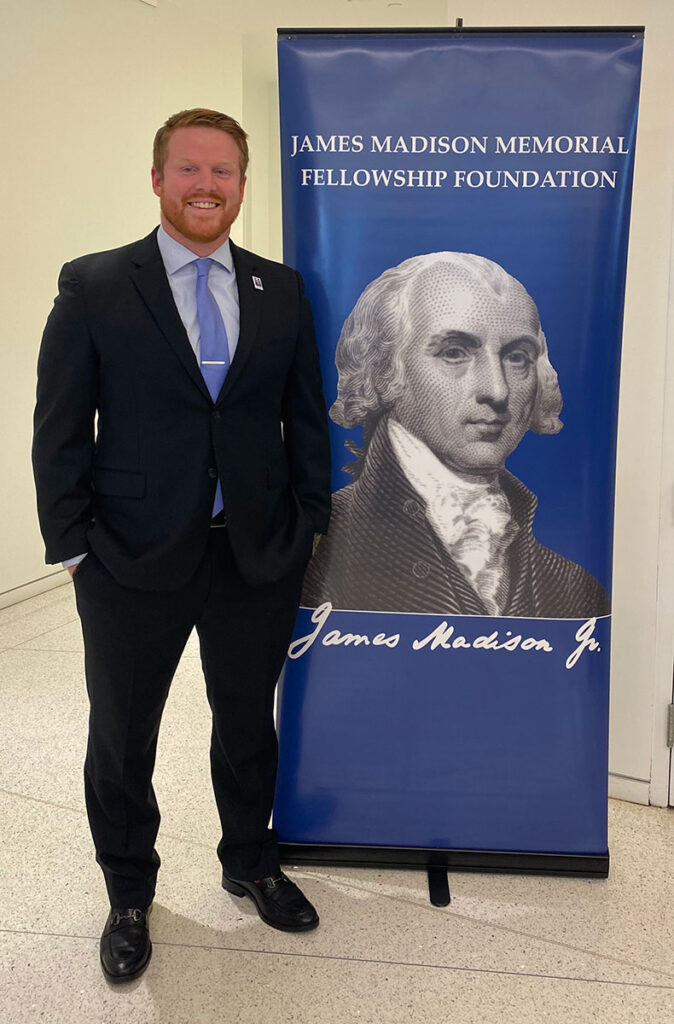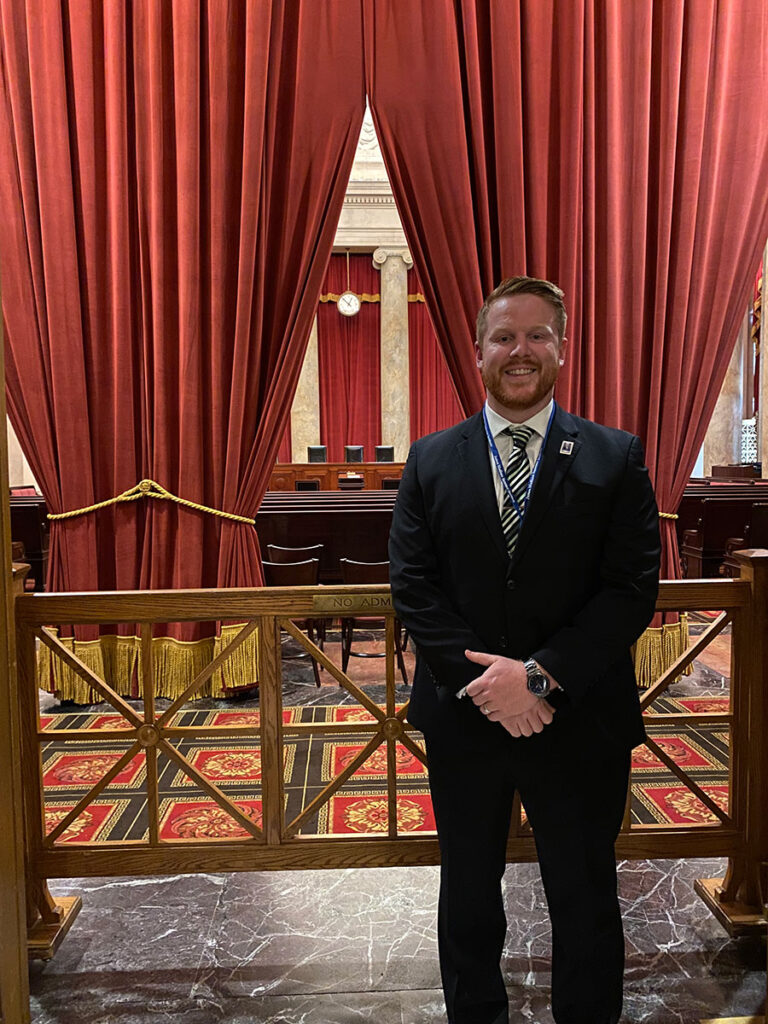Graduate history student awarded prestigious James Madison Graduate Fellowship
By Vicki-Ann Downing
Michael McNamara ’24G, a student in the graduate history program at Providence College, completed a four-week summer institute on the U.S. Constitution in Washington, D.C., as the Rhode Island recipient of the prestigious James Madison Graduate Fellowship.
The program, which took place from June 10 to July 7, 2023, is designed to help high school history, government, and civics teachers teach the U.S. Constitution. It includes an award of up to $24,000 toward completion of a master’s degree. McNamara, a history teacher at Ponaganset High School in Glocester, Rhode Island, is scheduled to complete his PC degree in May 2024.
McNamara is the third graduate history student from PC to be selected for the fellowship. Maeve Kennedy ’19G was chosen in 2018. Christopher Stanley ’95, ’25G,who also teaches history at Ponaganset, was selected in 2022.

James Madison, the fourth president of the United States, known as the “Father of the Constitution” and “Father of the Bill of Rights,” was the author of the Federalist Papers with Alexander Hamilton and John Jay. The James Madison Memorial Fellowship Foundation, created in 1986 by an act of Congress, is an independent agency of the executive branch of the government. The foundation offers one fellowship per state per year.
“The idea is that if we’re going to have strong republic, citizens need to be educated about it,” McNamara said.
The institute’s focus was a six-credit graduate course, Foundations of American Constitutionalism, hosted by Georgetown University. Taught by constitutional scholars, it was a study of the principles, framing, ratification, and implementation of constitutional government in the United States. Before McNamara left for D.C. in June, he read a 400-page packet of primary sources from the 17th and 18th centuries that would be taught during the program. He also was required to read four anthologies containing the Federalist Papers, Anti-Federalist Papers, Madison’s Notes from the Constitutional Convention, and a collection of key documents from 1763-1789.
In Washington, he heard from guest speakers such as H.W. Brands, Ph.D., historian and author; John King Jr., J.D., Ed.D., education secretary under President Obama; and Royce C. Lamberth, LL.B, senior judge for the U.S. District Court, District of Columbia, who is handling cases regarding the Capitol riots. The fellows visited Arlington National Cemetery, the National Mall, Independence Hall, Mount Vernon, and Gunston Hall, and were given special access to the Museum of the American Revolution, National Constitution Center, National Museum of African American History and Culture, the Supreme Court Building, and the Library of Congress.
“The experience gave me a deep and nuanced understanding of the Constitution and foundations of American democracy,” McNamara said. “I feel blessed to have learned from the nation’s top scholars. The Summer Institute challenged my thinking and pushed me harder academically than ever before. That was the purpose — to make me a better historian and educator, so I can help my students develop into stronger citizens.”

Through the fellowship, McNamara has joined a network of top civics and American history teachers who can serve as resource to others. He already is helping to evaluate new social studies standards with the Rhode Island Department of Education and is implementing the changes at his school.
McNamara is a Patricia Behring Teacher of the Year from Rhode Island for 2023. He was nominated because of his participation in National History Day, which encourages middle and high school students to conduct original research on topics of regional interest. McNamara has helped oversee National History Day at Ponaganset for several years.
He was one of 30 teachers from around the country chosen to participate in National History Day’s Revolutionary Ideals program, which considered how the ideals of the American Revolution were applied. McNamara contributed a lesson to help students engage with primary sources and use active learning strategies to further historical thinking skills. His lesson was on the role of the Burning of the Gaspee in the broader American Revolution. It will be published this year in preparation for the celebration of the 250th anniversary of the Declaration of Independence in 2026.
McNamara grew up in Goshen, Indiana, and came to New England to attend Salve Regina University, where he studied history and secondary education and played football and rugby. It’s also where he met his wife, Gabriella. After graduating in 2016, he taught history and coached football at St. Raphael Academy in Pawtucket before joining the teaching staff at Ponaganset in August 2020.
He decided to pursue a master’s degree in history at PC thanks in part to the Friar alumni network. At St. Raphael, his department head was Ken Kirejczyk ’03G, and he taught with two teachers who held PC master’s degrees, William Benson ’17G and Maria Turner Schappler ’18G. Since he began teaching at Ponaganset, Roger Forand ’88 has been his department chair.
“Providence College is small, but it has a larger-school atmosphere through its reputation,” McNamara said. “What blew me away is how affordable the graduate program was, which is not something people usually associate with private Catholic colleges or universities, or master’s degree programs in general.”
In his graduate studies, he focused on areas of history that he hadn’t already studied in an academic setting. This included courses as diverse as History of Latin American Theology with Rev. David Orique, O.P.; History of Sports with Rev. John Vidmar, O.P.; Europe 1933-1943 with Matthew Dowling, Ph.D.; and Cold War in Global Perspective with Margaret Manchester, Ph.D. He is pleased that classes meet in person and that class sizes are capped at fewer than 10 students, most of them working professionals.
“There is a benefit of a sweet little pocket of eight to nine students,” McNamara said. “There is enough diversity of opinions and backgrounds that you do have solely heterogenous discussions, but it isn’t a mob where you’re just watching two people in a verbal tennis match go back and forth. All the discussions are content-based, intellectual discourse. It’s nice to go from being the person who has to provide all the information to the person working through it with everyone else — from being a teacher to being a student.”
He will use his graduate degree, which was fully funded through the fellowship, to teach dual-enrollment courses at his high school — courses in which high school students can earn college credit — and perhaps to further his education toward a Ph.D.
“I’m eager to bring what I’ve learned from the fellowship to the kids at my school and my community,” McNamara said. “The hope is that we better ourselves so we can better other people. Education is civil service. I love what I do, I’m passionate about it, and I always want to be better. Government is best where people are involved and citizens have real power. We have a duty to educate people so they can make the best decisions possible for their lives and those around them.”
graduate programs at pc




